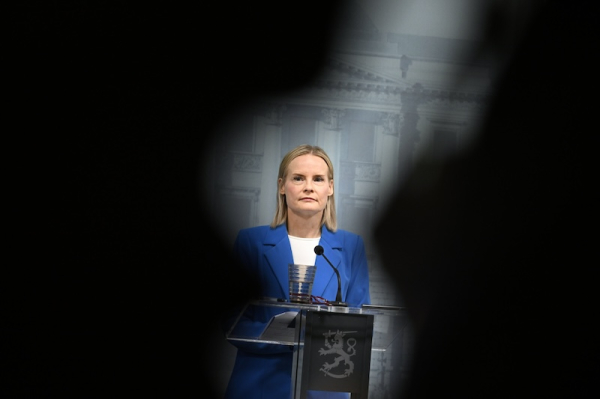
Minister of Finance Riikka Purra at the government’s budget framework negotiations press conference at the Government Palace briefing room in Helsinki on 23 April 2025. Photo: Jussi Nukari / Lehtikuva
- Next Article Helsinki Zoo euthanises ageing Amur tiger to make way for new breeding male
The Finnish government will close a tax loophole popular among high-earning social media influencers by outlawing artificial holding company arrangements designed to minimise dividend taxation.
Finance Minister Riikka Purra announced the measure on Wednesday during a press conference outlining new tax increases agreed in the government’s mid-term budget session.
“This is what we call the influencer massimuija clause,” Purra said, using the colloquial term for wealthy female influencers that has circulated on social media.
The reform targets artificial share exchange arrangements in which influencers and other entrepreneurs transfer the ownership of their operating companies to newly established holding companies. These structures allow dividends to be paid through the holding entity, often significantly reducing the tax burden.
According to the government, the adjustment will bring in €30 million in annual revenue. The decision is part of a broader push to tighten dividend taxation rules and prevent tax planning strategies that exploit technical loopholes without reflecting actual business changes.
The practice came under national scrutiny following media reports that Natalia Salmela, one of Finland’s best-known influencers, had promoted the tax strategy through a private WhatsApp group called “massimuijat,” in collaboration with auditing giant KPMG and investor Jasmin Hamid.
In February, Helsingin Sanomat reported that Salmela’s group marketed legal tax minimisation tactics to fellow content creators. Salmela, who has consistently defended the practice, responded to the new policy on Instagram: “What the hell is happening here? I can influence the government’s budget decision with one PR event, lol.”
Despite the sarcastic tone, the influencer acknowledged the media attention, writing that while she has not personally benefited from the loophole, the “crazy amount of publicity” has been a side effect.
A tax specialist from the NGO Finnwatch told Yle that the use of holding companies has become increasingly common in influencer business models. The annual tax advantage per person has reached as high as €20,000 in some cases, they estimated.
“This works best in industries like content creation, where income is consistent and personal brand-based, making it easier to route income through a corporate structure,” said Finnwatch tax analyst Saara Hietanen.
Purra defended the measure as necessary to maintain fairness in the tax system.
“This is about upholding the integrity of the corporate tax code,” she said.
The change will primarily affect high-income earners and entrepreneurs who have used these arrangements for non-commercial purposes. It complements other recent tax adjustments aimed at limiting loopholes in capital income taxation.
The Ministry of Finance has not disclosed an exact implementation timeline, but the clause is expected to be included in the 2026 tax reforms.
HT
- Next Article Helsinki Zoo euthanises ageing Amur tiger to make way for new breeding male
Source: www.helsinkitimes.fi
